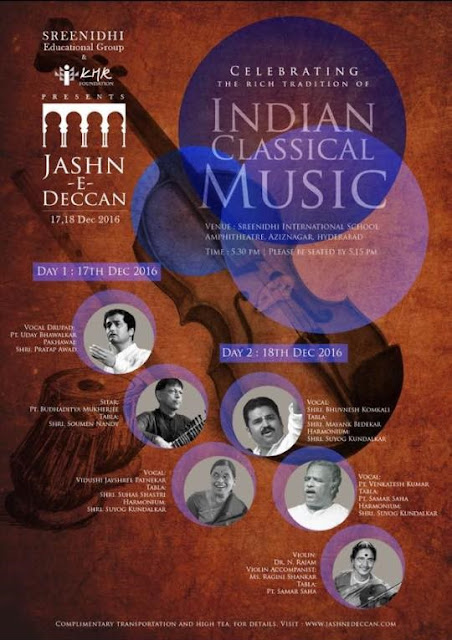Hyderabad ke Jashn
Jashn
E Deccan: beautifully unconventional
Sruti published this piece in its April 2017 issue. Thanks are due to the team at Sruti.
My
mother asked me if the music festival organized in December 2015 on the
outskirts of the town would be organized this winter too. Some days later came
the flier for the second edition of the Jashn
E Deccan festival in Hyderabad.
Jashn
E Deccan is an annual festival celebrating the rich traditions of various
Indian music and dance forms under the aegis of the KMR Foundation – a trust
started by the children of K. Mahipathi Rao, in June 2008, to honour his memory
and the ideals he valued. It is their endeavour to create a vibrant and
inclusive space in the realm of music and dance. The festival is meant to
ignite interest, create curiosity and enthuse people to make the experiential
journey of listening to and watching some great exponents of Indian music and
dance. The events are totally free and open to music and dance enthusiasts.
During
the previous edition Pandit Biswajit Roy Choudhury, one of the artists, had
described event as, ‘Everything here is
so beautifully unconventional’. Ustad Abdul Rashid Khan’s performance at
the event unfortunately turned out to be his final performance; that evening at
the age of 108 he stunned all present and redefined a few terms.
The
2016 edition, held at the same venue – the Sreenidhi
International School - had performances by six artists spread over two evenings.
Pandit Uday Bhawalkar began the proceedings with raga Yaman and moved on to
Shivranjani. His performance underlined the fact that an artist must enjoy his
performance for the audience to enjoy it. He was followed by veteran Budhaditya
Mukherjee who began with the raga Shuddha Kalyan. The smile on his face as he
played the sitar and the manner in which his ‘partnership’ with the
accompanying artists shaped as they changed gears and paved way for others was
remarkable. The final performance was by Jayashree Patnekar.
The
amphitheatre appeared as beautiful as the moon with the palash flowers in
bloom, at the edge. The arrangements were indeed unconventional - simplicity
with a touch of finesse. On the one hand, several chairs were empty but when you
looked around you realized that those who had come were connoisseurs of Indian classical
music, which the event celebrates, and were soaking in the performances.
The
second day began with Multani raga by Bhuvnesh Komkali. Being Kumar Gandharva’s
grandson, it was not surprising he ended with a nirgun bhajan. Pandit Venkatesh
Kumar who followed, got requests to sing more from a swaying audience when he
indicated closure of his session. He also sang ‘Holi khelat mo se nahi re’ and left me wondering on the impact Holi
has on our culture - holi songs are also sung at the Nizamuddin Dargah! Dr. N. Rajam
ended with a bhajan on violin.
Each
performance went on for about an hour and this appeared to make sense. They
were also of a quality which ensured silence and were so much more alive than
the dead and sterile presentations many of us are subjected to. At other places
the speakers need to be stopped – here they sought permission to begin! It was good
also to see parents come with their children, enabling them to have an exposure
that could kindle an interest in what they heard.
At
a personal level the time flew. On occasions I felt akin to how I feel during
meditation sessions and on others my mind wandered to what I love doing; out on
the bike in Central India, caressing the openness in this case.
The
performances were brilliant, the coffee was good and also the arrangements for
the school buses to pick and drop were commendable.
In
recent months Hyderabad has been providing opportunities to soak in our culture
by way of these festivals. Jashn
E Khusrau was organized in November 2016 at multiple venues across the city
including at Chowmahalla. This year’s
highlight was the participation of Tanoura dancers from Egypt. Overlapping with
the Jashn E Deccan was the Ruhaniyat at
Taramati Baradari. The city has also seen rise in popularity of venues that
house cultural events, albeit at a separate scale; of these Lamakaan
remains a personal favourite.
Posts
on events on similar lines


Comments
Post a Comment